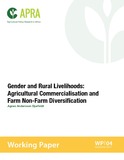| dc.contributor.author | Andersson Djurfeldt, Agnes | |
| dc.coverage.spatial | Ghana | en |
| dc.coverage.spatial | Kenya | en |
| dc.coverage.spatial | Tanzania | en |
| dc.coverage.spatial | Mozambique | en |
| dc.coverage.spatial | Malawi | en |
| dc.coverage.spatial | Zambia | en |
| dc.date.accessioned | 2018-02-19T14:38:35Z | |
| dc.date.available | 2018-02-19T14:38:35Z | |
| dc.date.issued | 2017-09-01 | |
| dc.identifier.citation | Andersson Djurfeldt, Agnes. (2017) ‘Gender and Rural Livelihoods: Agricultural Commercialisation and Farm Non-Farm Diversification’ APRA Working Paper 4, Future Agricultures Consortium | en |
| dc.identifier.isbn | 978-1-78118-423-3 | |
| dc.identifier.uri | https://opendocs.ids.ac.uk/opendocs/handle/20.500.12413/13562 | |
| dc.description.abstract | The resurrection of smallholder-based development approaches in the early 2000s renewed a longstanding focus on small farmers after the lost decades of the 1980s and 1990s. Under the conceptual umbrella of ‘propoor agricultural growth’, inclusivity and agricultural commercialisation have become the guiding lights of policy agendas devoted to reforming African smallholder agriculture. Linking small farmers to agricultural output markets – whether domestic or global – constitutes a pivotal aspect of such approaches. The possibilities of linking smallholders to markets rest on supply side as well as demand side factors, related to the production of a marketable surplus as well as the functioning of markets themselves. Much research has been concerned with the gendered patterns of agricultural production, tied to aspects such as cropping, technology uptake, and gender gaps in productivity and access to extension services. With the exception of the global value chain literature much less interest has been devoted to the gender dynamics of commercialisation, both in the mainstream developmentalist literature and in feminist post-structuralist work. Gender-based studies of rural livelihoods, meanwhile, tend to depart from land and labour markets, whether dealt with through the economic perspectives of allocative inefficiencies or as seen through the structuralist lens of political economy rather than the empirical question of how women and men make a living in rural areas. Given the well-known male bias in land tenure systems in most of Africa, the relative discrimination of women under these tenure systems is by now well documented. Less is known, however, of how or even if, such biases also translate into exclusion from agricultural output markets and how this in turn may be connected to women’s access to non-farm sources of livelihood. This paper uses a cross-country comparative perspective in analysing gendered patterns of agricultural commercialisation and rural livelihoods. A first research question addresses whether female farm managers are in fact excluded from agricultural commercialisation (and by implication incomes) when compared to their male counterparts. Whether the sources of this exclusion can be found in the functioning of markets themselves or factors inherent to the household constitute an important sub-question. Secondly, the paper analyses if and how access to non-farm incomes varies by gender and by extension, whether incomes from the non-farm sector can compensate for poorer access to agricultural incomes among female farm managers. Thirdly, how the prospects vary for commercialisation and livelihood diversification among the two different types of femaleheaded households (de facto and de jure) will be considered. Finally, the income-generation patterns of those women who live in male-headed households will be addressed. The analysis in what follows will be guided by these questions, and positioned in relation to existing theoretical and empirical research frontiers and gaps. | en |
| dc.language.iso | en | en |
| dc.publisher | APRA, Future Agricultures Consortium | en |
| dc.relation.ispartofseries | APRA Working Papers;4 | |
| dc.rights.uri | http://creativecommons.org/licenses/by-nc-nd/3.0/ | en |
| dc.subject | Agriculture | en |
| dc.title | Gender and Rural Livelihoods: Agricultural Commercialisation and Farm Non-Farm Diversification | en |
| dc.title.alternative | APRA Working Paper 4 | en |
| dc.type | Unpublished/work in progress | en |
| dc.rights.holder | APRA, Future Agricultures Consortium | en |
| dc.identifier.team | Rural Futures | en |
| dcterms.dateAccepted | 2017-09-01 | |
| rioxxterms.funder | Department for International Development, UK Government | en |
| rioxxterms.identifier.project | APRA | en |
| rioxxterms.version | NA | en |
| rioxxterms.funder.project | e1f6d3be-457a-4f13-8b1f-6748d1402d83 | en |


